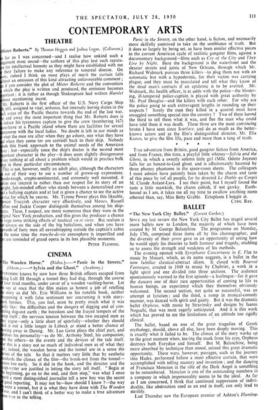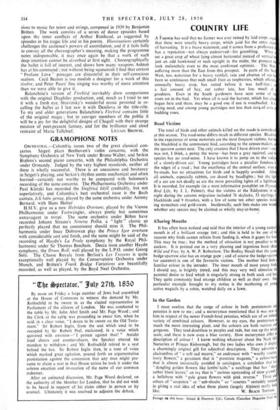BALLET The New York City Ballet." (Covent Garden.) SINCE my
last review the New York City Ballet has staged several more ballets new to London, the majority of which have been created by M. George Balanchine. The programme on Monday, July 17th, comprised three items all by this choreographer, and the diversity of their genre gave us an opportunity of seeing how he would apply his theories to both humour and tragedy, enabling us to assess the strength and weakness of his methods. The evening opened with Symphonie Concertante in E. Flat to music by Mozart, which, as its name suggests, is a ballet in the now familiar classical-abstract idiom. It closed with Bourree Fantasque, created in 1949 to music by Chabrier, a work in a light spirit and one diN ided into three sections. The audience spontaneously warmed to the first episode—a burlesque—for it gave the dancers one of their rare opportunities of coming to life as human beings, an experience which they themselves obviously welcomed. The second section, not quite so successful, was an attempt at lyricism ; and the third, a romp in musical-comedy manner, was danced with spirit and gaiety. But it was the dramatic ballet Orpheus, with music by Stravinsky and designs by Isamu Noguchi, that was most eagerly anticipated. And it is this work which has proved to me the limitations of an attitude too rigidly clinical.
The ballet, based on one of the great tragedies of Greek mythology, should, above all else, have been deeply moving. This is exactly what it failed to be. The climax of the story works up to the great moment when, tearing the mask from his eyes, Orpheus destroys both Eurydice and himself. But M. Balanchine, being more absorbed by technique than mood, missed this great dramatic opportunity. There were, however, passages, such as the journey into Hades, performed before a most effective curtain, that were accomplished with telling mastery and invention ; and the dancing of Francisco Moncion in the role of the Dark Angel is something to be remembered. Moncion is one of the outstanding members in a company in which impersonality seems to be the ideal. As far as I am concerned, I think that continued suppression of indivi- duality, like abstraction used as an end in itself, can only lead to sterility. Last Thursday saw the European premier of Ashton's Illumina- lions to music for tenor and strings; composed in 1939 by Benjamin Britten. The work consists of a series of dance episodes based upon the inner conflicts of Arthur Rimbaud, as suggested by episodes in his tragic life and in his poems. Illuminations certainly challenges the audience's powers of assimilation, and if it fails fully to convey all the choreographer's meaning, making the programme notes indispensable, it may once again be that a work of such deep intention cannot be absorbed at first sight. Choreographically the ballet is full of interest, and shows how many weapons Ashton has at his command ; but without being squeamish I find that certain " Profane Love " passages are distasteful in their self-conscious realism. Cecil Beaton is too modish a designer for a work of this timbre, and Peter Pears' fine singing was worthy of more attention than we were able to give it.
Balanchine's version of Firebird inevitably drew comparisons with the original Diaghilev production, and, much as I tried to see it with a fresh eye, Stravinsky's wonderful music persisted in re- calling the ballet as I last saw it with Danilova in the title-role. To my and older generations Balanchine's Firebird contains little of the original magic ; but to youriger members of the public it will be a joy for the delightful designs of Chagall with their strange mixture of poet-peasant fantasy, and for the brilliance and aloof



































 Previous page
Previous page